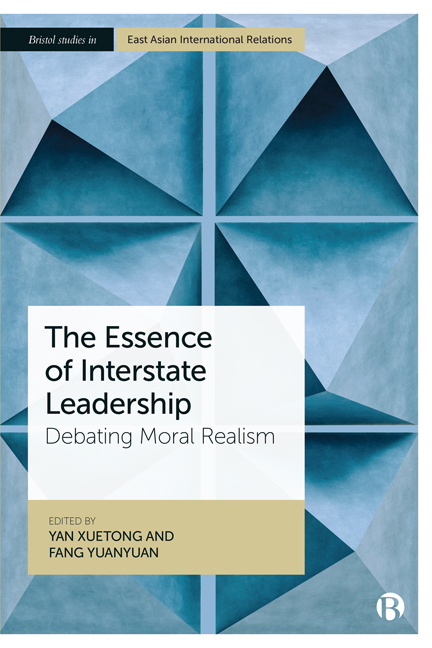Book contents
- Frontmatter
- Contents
- List of Abbreviations
- Notes on Contributors
- Preface
- 1 Interstate Leadership, Moral Realism, and their Critics
- 2 IR Moral Realism as a Universal Theory
- 3 Moral Realism as an Alternative Approach to the Agent-Structure Problem
- 4 Prospects, Promise, and Limitations of Moral Realism
- 5 Ideal Morality and Realist Interest of Moral Realism
- 6 The Conception of Morality in Moral Realism
- 7 Moral Realism and Hegemonic Transition
- 8 Innovation of Moral Realism and Dialogue with It
- 9 Moral Realism and Sino-American Relations
- 10 Moral Realism on Interstate Leadership in Response to Critics
- Appendix 1 Written Discussion between Rajesh Rajagopalan and Yan Xuetong
- Appendix 2 ‘Chinese School’ as an Inappropriate Title
- Selected Bibliography
- Index
4 - Prospects, Promise, and Limitations of Moral Realism
Published online by Cambridge University Press: 18 January 2024
- Frontmatter
- Contents
- List of Abbreviations
- Notes on Contributors
- Preface
- 1 Interstate Leadership, Moral Realism, and their Critics
- 2 IR Moral Realism as a Universal Theory
- 3 Moral Realism as an Alternative Approach to the Agent-Structure Problem
- 4 Prospects, Promise, and Limitations of Moral Realism
- 5 Ideal Morality and Realist Interest of Moral Realism
- 6 The Conception of Morality in Moral Realism
- 7 Moral Realism and Hegemonic Transition
- 8 Innovation of Moral Realism and Dialogue with It
- 9 Moral Realism and Sino-American Relations
- 10 Moral Realism on Interstate Leadership in Response to Critics
- Appendix 1 Written Discussion between Rajesh Rajagopalan and Yan Xuetong
- Appendix 2 ‘Chinese School’ as an Inappropriate Title
- Selected Bibliography
- Index
Summary
Drawing on Confucian morality, Professor Yan Xuetong has developed an ambitious theory of moral realism that aims to improve on neorealism by incorporating morality into the neorealist theory of international politics. Yan has been heavily influenced by ancient Confucian thinkers as he stresses the importance of states’ responsible political leadership in bringing about international change and international humane authority that promotes universal moral norms. Nonetheless, his theory is more than just a synthesis of the neorealist theory with Confucian morality. Yan's emphasis on the effects of morality on international politics also resonates with the constructivist concern about moral norms to a certain extent.
This chapter examines the basic assumptions and arguments of Yan's moral realism, analyses its prospects and promises by comparing moral realism with two mainstream Western international relations (IR) theories, neorealism and constructivism, and also critically evaluates the limitations of moral realism. The first part of the chapter provides an overview of mainstream IR theories and the potential contributions of moral realism. The second part places moral realism in the context of cross- cultural academic dialogue between moral realism and mainstream Western IR theories, with a detailed comparison between moral realism on the one hand and neorealism and constructivism on the other. The third part critically evaluates moral realism and identifies its limitations.
Mainstream Western IR theories and the promise of moral realism
The field of mainstream IR has been dominated by three major international relations: neorealism, neoliberalism, and constructivism. Kenneth Waltz formulated his influential neorealist theory based on three important assumptions about international politics. First, international politics is anarchic, meaning the absence of world government. Second, states are unitary actors in international politics, and domestic politics is not important in international politics. Third, states are rational and utility maximizers, which means states tend to act to maximize their national interests defined as power. Power is measured mainly in terms of economic and military resources. Thus, Waltz postulated that given the anarchic nature of international politics, states’ behaviours are mainly determined by anarchy and the distribution of states’ capabilities (or material power) in the international system.
- Type
- Chapter
- Information
- The Essence of Interstate LeadershipDebating Moral Realism, pp. 52 - 73Publisher: Bristol University PressPrint publication year: 2023



